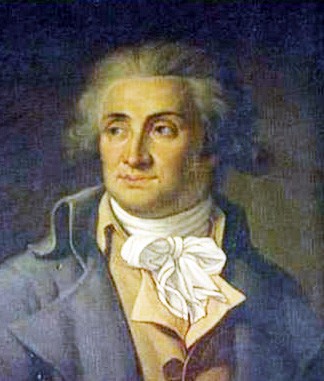Epistemic status: stories illustrating a non- controversial but important historical pattern.
Later articles will explore the historical and scientific track record of our moral intuitions and explicit moral reasoning. I treat these articles primarily as a review of the work of Josh Greene, Nick Beckstead and others, complemented by a few stories that I like. This first article explores the notion of moral progress and the causal force of ideas. It suggests that we shouldn’t be surprised if the most important causes of our time are counter-intuitive.
France, 1794

In 1794, Marquis de Condorcet was experiencing the full extent of human tribalism that ensued during the Jacobin reign of terror. As a prominent moderate revolutionary, he was hiding from the angry mob organized under the motto of liberty, equality and fraternity.
It had been months since Robespierre labeled Condorcet a traitor and an enemy of the revolution. The marquis was guilty of raising his voice against the new Jacobin constitution – in his 1793 speech, he had pointed out that it had little in terms of checks and balances on central power. After losing this battle, he left into hiding for several months[1].
Condorcet was soon to join the venerable tradition of martyrs for philosophy that goes back at least to Socrates. A few months hence, he would commit suicide [2] in his cell after leaving his hideout and getting caught by the Jacobins.

Condorcet found dead in his cell.
Despite these unlucky circumstances, Condorcet was not one to lament his fortune and procrastinate in his last days. It was in this period that he wrote perhaps his greatest work, the optimistic Sketch for a Historical Picture of the Progress of the Human Mind.
In this typical expression of Enlightenment optimism, he argued that an improved understanding of the world would lead to economic, social and moral progress:
Our hopes, as to the future condition of the human species, may be reduced to three points: the destruction of inequality between different nations; the progress of equality in one and the same nation; and lastly, the real improvement of man.
Condorcet was building on rather eventful two decades in which he haactively hastening this progress. In the 1770's, he had decided to leave the pleasant world of abstract mathematics. Along with his fellow French philosophes, as well as his foreign friends and pen friends – Benjamin Franklin, Adam Smith, Thomas Jefferson - he used Enlightenment reasoning based on logic, science and universal humanism to find flaws in conventional wisdom.

The Mouth of Iron, the newsletter of Condorcet's Society of the Friends of the Truth - a predecessor to the EA Forum and LessWrong
This led him to endorse and act on a number of fringe ideas:
- He founded the Society of the Friends of Blacks in the 1780’s and was a key thinker in the abolitionist movement.
- Along with his brilliant wife Sophie, he was one of the first advocates of women’s suffrage. His essay On the Admission of Women to the Rights of Citizenship laid the intellectual foundations for early feminist thought.
- Despite his aristocratic background, he was an active advocate of democracy and one of the key figures in the French Revolution (before being labeled as too moderate).
- He was perhaps the first quantitative social scientists and laid the foundations for thinking about the designs of social systems that best reflect the preferences of all people.
In short, Condorcet got almost everything right. He was also part of a broader intellectual movement that managed to identify many flaws in commonsense morality and spark a cultural and institutional change around the world – from the gradual abolition of slave trade and slavery to the spread of democracies. The Enlightenment.

The Republic of Letters visualized by Stanford data scientists
Königsberg
To the east, in the Prussian town of Königsberg, the banner of the Enlightenment was held by a very different thinker – one Immanuel Kant. Although he never ventured far from his hometown, the same cannot be said for his ideas. From philosophy departments to the Universal Declaration of Human Rights, they are still making a lasting impact on the world.

Kant's contemporary, Johann Herder, describes how he challenged others to think about the important problems of their time:
Speech, the richest in thought, flowed from his lips. Playfulness, wit and humour were at his command. . . . No cabal, no sect, no prejudice, no desire for fame could ever tempt him in the slightest way from broadening and illuminating the truth. He incited and forced others to think for themselves; despotism was foreign to his mind.
The "playfulness, wit and humour" are often easy to miss in his writings[3]. But his intellectual track record is certainly impressive.
Like Condorcet, Kant managed to identify and advocate for progress on some of the non-obvious causes of his time. He defended democracy (back then it needed defending). He was an early advocate of global cooperation on causes like trade and peace. And perhaps most importantly, he defended the Enlightenment values themselves.
Kant’s defense of the use of reason and science as vehicles for the improvement of the human condition shines through in his essay What is Enlightenment. He traces the essence of the body of thought to independent thinking unencumbered by pressures from authorities or the supernatural:
Enlightenment is man's emergence from his self-imposed immaturity. Immaturity is the inability to use one's own understanding without another's guidance. This immaturity is self-imposed if its cause lies not in lack of understanding but in indecision and lack of courage to use one's own mind without another's guidance. Dare to know! (Sapere aude.) "Have the courage to use your own understanding," is therefore the motto of the enlightenment.
In some cases, this independent thought paid off. However, at other times, his moral compass failed to point him to the trend of the expanding circle of moral concern. For instance, he believed that “wives, servants, and children are possessed in a way akin to our possession of objects.” Consequently, they “should not be permitted to vote or take an active role in the affairs of state”.
He held similar views on homosexuality. In his opinion, it was an "unmentionable vice" so wrong that "there are no limitations whatsoever that can save [it] from being repudiated completely".

Kant's king Frederick the Great would probably beg to disagree with Kant's account of the moral status of homosexuals.
Kant's Failure
Kant’s failure gives me a pause – if one of the greatest moral philosophers in history made such massive mistakes, how likely is it that I am not making similar ones?
In his thesis On the Overwhelming Importance of Shaping the Far Future, Nick Beckstead pithily summarizes the same concern:
1. In the past, there was widespread, correlated, biased moral error, even on matters where people were very confident.
2. By induction, we make similar errors, even on matters where we are very confident.
In other words, if history is a guide, then future generations will almost certainly consider some of my beliefs and actions atrocious. But which ones? Is there a way to get closer to Condorcet's track record in terms of anticipating moral progress?
It would be extremely useful to get a visit from the future and receive a prioritized list of the most important blind spots. Short of that opportunity, I will try a different exercise: I will imagine visiting Kant in Königsberg and trying to talk him out of his parochial views. And hope that I learn something along the way.
Such a quest might be far from trivial. Finding knock-down logical arguments that would resonate with Kant would likely be a Sisyphean task.
But I would be at least mildly optimistic. While both Kant and I are both a far cry from the proverbial "ideal Bayesian reasoner", we are committed to the same core principles–to changing our beliefs if they don’t hold up against reason and empirical observation.
I could therefore take a less direct approach: undermine Kant's confidence in his moral judgments - both his intuitive gut responses and the more explicit, analytical ones - by pointing him to some of the most glaring failure modes of both.
And in doing so, I would be able to work with more than two centuries of science that directly builds on the Enlightenment foundations laid by Kant, Condorcet and others.
I could also use Kant’s explicit commitment to putting his money where his mouth is:
The usual touchstone, whether that which someone asserts is merely his persuasion — or at least his subjective conviction, that is, his firm belief — is betting. It often happens that someone propounds his views with such positive and uncompromising assurance that he seems to have entirely set aside all thought of possible error. A bet disconcerts him.
Turning abstract philosophical arguments into empirical statements about how human moral judgment works in different circumstances (and betting on them, in case of disagreement) could thus turn a frustrating process into a win-win situation: either you win money or a more accurate belief.
Indeed, evolutionary, moral, social and cognitive psychology have uncovered a few things that should make anyone - even Kant - leave their uncompromising assurance and seriously consider the possibility of major error.
As an appetizer, I would show Kant the series No-nonsense metaethics by Luke Muehlhauser which provides a summary of some surprising findings from moral psychology and neuroscience:
- Our moral judgments are significantly affected by whether we are in the presence of freshly baked bread or a low concentration of fart spray that only the subconscious mind can detect.
- Our moral judgments are greatly affected by pointing magnets at the point in our brain that processes theory of mind.
- […]
- People give harsher moral judgments when they feel clean.
And there is much more. I think Kant would probably come away be excited about how the Enlightenment project turned out.
Further reading
No-nonsense metaethics by Luke Muehlhauser
On the Overwhelming Importance of Shaping the Far Future by Nick Beckstead
Three Heuristics for Finding Cause X by Kerry Vaughan
Keynote by Will MacAskill and Toby Ord, EA Global 2016
---
[1] His speech at the constitutional convention was only the last in the series of his crimes. Because of his distaste for factionalism and tribalism, Condorcet had never officially joined a party, but he had always been intellectually and socially close to the moderate Girondists. In 1791, Condorcet proposed a “soft” treatment of the king Louis XVI – sending him to the galleys instead of the Jacobin punishment of choice, the guillotine. He also argued that the constitutional convention should respect the separation of powers and not take justice into its hands.
[2] Some historians hypothesize that he was murdered by the Jacobins
[3] Especially when he gets into “transcendental apperception” and the like

Is this a real quote from Kant?
Seriously though? I feel like we should've shouted this from the rooftops if it were so. This is an awesome quote. Where exactly is it from / did you find it?
From Critique of Pure Reason (h/t Daniel Filan, h/t Bryan Caplan) : http://www.econlib.org/archives/2014/07/kant_on_betting.html